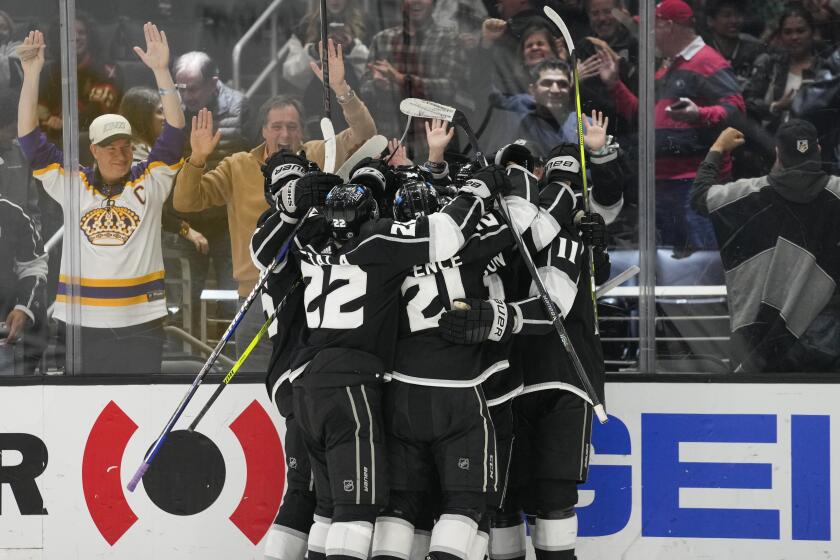A’s case could ride on ice road
We rarely get to drop the name of Wayne Gretzky into the baseball column. We do so today because his hockey team could throw baseball into a state of chaos, in the Golden State and perhaps beyond.
Gretzky coaches the Phoenix Coyotes, the NHL team that filed for bankruptcy last month. The Coyotes want to recoup as much money as possible by selling the franchise to Jim Balsillie, the guy behind the BlackBerry, who would move the team to Canada. The NHL says no, that only the league can decide who owns a team and where it can play.
Bud Selig says the same thing about his league, but his lieutenants appear more than a little worried about the Coyotes case and the precedent it might set. The commissioner’s office has intervened in the bankruptcy court, in support of the NHL, at a time when Selig has committed himself to getting the Oakland Athletics into a new ballpark.
The Minnesota Twins get one next year. The Florida Marlins get one in three years. That leaves the A’s as the only team left sharing its home with an NFL team indefinitely, and the return of the Raiders in 1995 wrecked the Oakland Coliseum for baseball.
Lew Wolff has worked on a new stadium for six years, two on behalf of the former A’s owners and four more since they sold him the team. He couldn’t get a deal done for a new ballpark in Oakland, and the deal he had for one in suburban Fremont blew up in February.
He wants to take the A’s to San Jose. He envisions a cozy 32,000-seat ballpark, adjacent to a downtown train station, in the largest city in the Bay Area.
San Jose already has secured the land. The A’s will pay the $400 million needed for construction, Wolff says, largely with revenue from a naming-rights deal with Cisco and a new cable contract with Comcast.
By the time the team’s latest class of freshman pitchers -- Brett Anderson, Trevor Cahill, Vin Mazzaro and Josh Outman -- gets expensive, the A’s could be in a new stadium. That, Wolff says, would enable the A’s to afford contract extensions rather than repeatedly sacrifice talent in trades driven by financial necessity.
This all sounds great, except to the San Francisco Giants. Under major league rules, the Giants’ territory includes San Jose, and they’re not about to hand San Jose to the A’s.
“We’re 16 miles from the Giants’ stadium now,” Wolff said. “We want to move 50 miles from it.”
To the Giants, that’s not the point. They financed $180 million to build their ballpark in San Francisco, promising to repay lenders with revenue from ticket sales and corporate sponsorships. The heart of their fan base, the Giants say, is closer to San Jose than to San Francisco.
Yet, when the Silicon Valley Leadership Group polled companies in the San Jose area, 87% of the respondents reported doing no business with the Giants, and two-thirds of those that did said they would support both teams if the A’s moved to San Jose.
In March, Selig asked Wolff to step back and appointed a task force to shepherd the A’s toward a new ballpark.
Wolff says there is no place to build in Oakland and has provided the task force with years of research showing why. Yet, an Oakland delegation led by planning commissioner Doug Boxer -- son of Sen. Barbara Boxer -- recently met with the task force and proposed several ballpark sites within city limits.
If this all comes down to money, the Giants could be in trouble. The A’s received $32 million in revenue sharing from other teams last year, Wolff says, but they wouldn’t need any in a San Jose ballpark. That could entice other owners to vote to strip the Giants of their rights to San Jose, no doubt coupled with a requirement that the A’s compensate the Giants for any losses.
And that, oddly enough, leads us back to the Coyotes.
In its effort to persuade the bankruptcy court that the Coyotes should not be allowed to sell the franchise without league approval, the NHL enlisted the NFL, NBA and MLB to file a brief on its behalf. A court ruling in favor of the Coyotes, according to the brief, “would adversely affect not only every other member club of the NHL but also the interests of [the other three leagues].”
That wording is curious, as it relates to baseball.
Under its heralded antitrust exemption, baseball has full authority to determine who owns its franchises and where they play. The NHL does not operate under an antitrust exemption, so we called Bob DuPuy, baseball’s chief operating officer, to ask why a ruling in favor of the Coyotes should have any effect on baseball.
He did not call back. We were told he did not wish to address this, at least publicly.
What if a court ruling encourages the Giants to file suit to preserve their territorial rights? The NHL has been embarrassed by revelations from documents filed in the Coyotes case, and baseball would prefer that the public not peek into its business files, even if the Giants were to lose.
Or what if Wolff is barred from San Jose and decides to move the A’s out of the Bay Area, or sell to someone who would?
“We haven’t thought of selling,” he said. “We want to stay in Northern California. Until we know we can’t do that, we’re not going to think of anywhere else.”
By the time Wolff gets his answer about San Jose, the Coyotes will have gotten their answer from the bankruptcy court.
“If Balsillie wins, the value of all sports franchises goes up, because they’ll all now have wheels on them,” an NHL governor told the Toronto Globe and Mail. “If you can move your team, the value goes up.”
It is difficult to imagine Wolff taking on Selig, since the two were fraternity brothers at Wisconsin.
But it is also difficult to imagine the A’s lasting much longer this way, with a fan base beaten down by years of management selling off the best players and trashing the Coliseum. The A’s sold 10,127 tickets Tuesday, a good crowd for triple A.
There is no good place to move a major league team, not Portland, not Las Vegas, not San Antonio. Washington has been a disaster.
If an owner could move wherever he wants, however, the obvious answer would be a third team in one of the two largest markets in the country, in northern New Jersey or in the Inland Empire.
The hurdles would be formidable, and there would be many. But imagine this: the Riverside A’s, with Wayne Gretzky throwing out the ceremonial first pitch.
--
More to Read
Go beyond the scoreboard
Get the latest on L.A.'s teams in the daily Sports Report newsletter.
You may occasionally receive promotional content from the Los Angeles Times.







